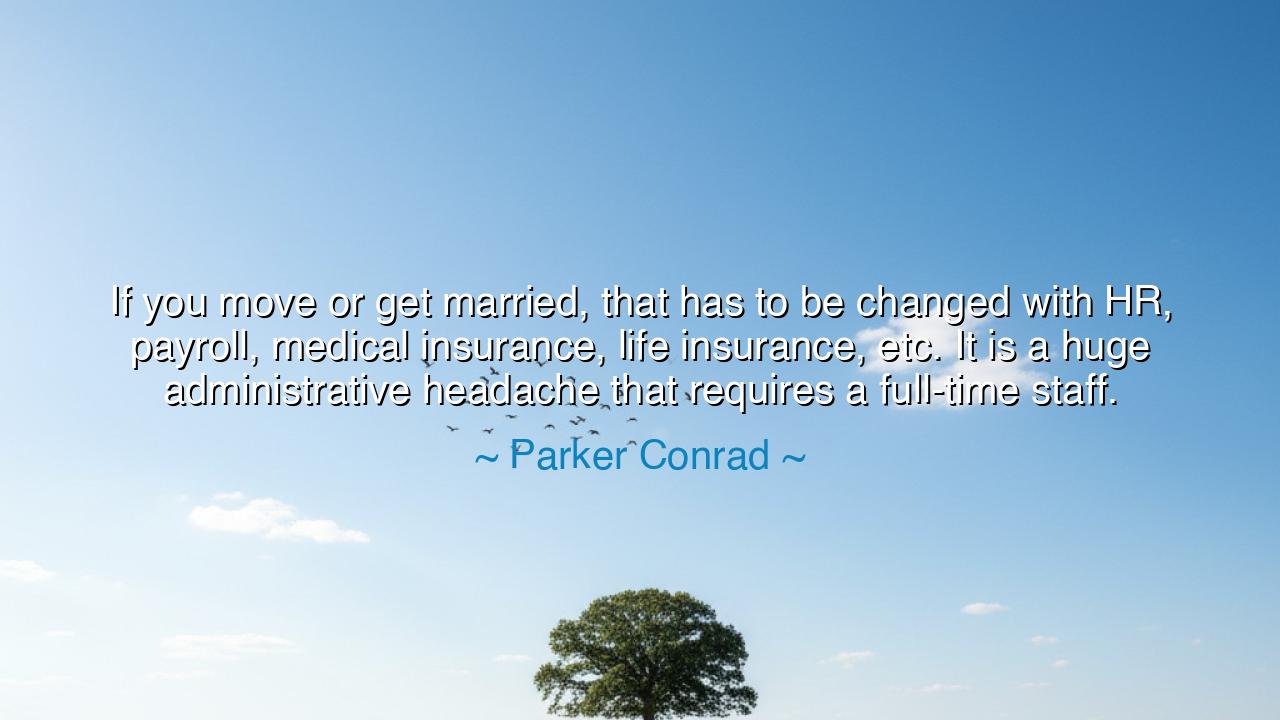
If you move or get married, that has to be changed with HR
If you move or get married, that has to be changed with HR, payroll, medical insurance, life insurance, etc. It is a huge administrative headache that requires a full-time staff.






The words of Parker Conrad speak not only to the burden of administration, but to the eternal struggle between order and chaos in human endeavor: “If you move or get married, that has to be changed with HR, payroll, medical insurance, life insurance, etc. It is a huge administrative headache that requires a full-time staff.” To the casual ear, these words describe the mundane frustrations of bureaucracy. Yet to the attentive mind, they carry a deeper truth about the weight of systems—how, as societies grow in power and complexity, the web of order can begin to ensnare the very people it was meant to serve. His words are a lament, but also a revelation: that even in the age of technological mastery, simplicity remains one of humanity’s rarest treasures.
From the earliest civilizations, men and women have built systems of record and responsibility to manage the affairs of the many. In the temples of Mesopotamia, scribes carved numbers into clay to track grain and wages; in the halls of Rome, clerks tallied soldiers’ pay and citizens’ taxes. These were the first human resource systems, the ancestors of today’s digital bureaucracy. Their purpose was noble—to bring order, fairness, and continuity to the lives of workers. Yet as time marched on, the systems multiplied, and their maintenance grew into a burden of its own. The shepherd of numbers became as weary as the shepherd of sheep. Parker Conrad’s quote captures this paradox perfectly: that in the pursuit of structure, we often create new chains of complexity.
To change one’s address, to declare a marriage, to alter a policy—these simple acts of life become entangled in forms, approvals, and databases. The joy of union or the promise of a new home is met not with celebration, but with paperwork. What should take moments consumes hours, and what should serve life instead burdens it. In this way, Conrad’s words reflect a larger philosophical question that has haunted humanity since the birth of civilization: can progress exist without complication? The more we build to make life easier, the more layers we create that must themselves be managed. The administrative headache becomes the unseen tax of modernity.
There is a story told of the Chinese emperor Qin Shi Huang, who sought to unify his vast empire under one written script, one currency, and one law. His vision was grand, his purpose clear—to simplify the chaos of divided states. But in his zeal, he built a bureaucracy so immense that it began to suffocate the people it was meant to serve. Records multiplied, decrees overlapped, and officials spent more time managing documents than lives. The empire was unified, yes—but under the weight of its own order. Conrad’s lament is a modern echo of this same truth: when systems forget their purpose, they become labyrinths without exits.
Yet, even in his frustration, there is wisdom to be gleaned. For Conrad, who founded companies dedicated to streamlining business systems, saw not only the problem but the potential for change. His words are not a surrender, but a challenge—to reimagine how institutions serve people, not the other way around. The full-time staff he speaks of is not just a cost of inefficiency, but a reminder of human ingenuity’s unfinished work. Where there is complexity, there is opportunity for innovation; where there is burden, there is a chance for liberation. Thus, his words call on thinkers, builders, and leaders to seek harmony between structure and simplicity.
The deeper lesson, then, is this: that life itself is an interplay between motion and management. To move is to grow, to marry is to transform, and in these transformations, change must ripple through every part of the systems that hold us. The wise do not curse this necessity; they seek to master it, to make it graceful rather than painful. Just as an artist must stretch the canvas before painting, so must a society stretch its systems to hold the shape of its progress. But when the canvas grows too tight, it must be loosened—or it will tear.
So, O seeker of balance, take heed of Parker Conrad’s truth: do not let the machinery of life overshadow its meaning. Whether in business, government, or the smallest household, let your systems serve life, not bind it. Simplify where you can. Build tools that free rather than constrain. Honor efficiency not as an idol, but as a path toward greater humanity. For the greatest systems are not those that control every detail, but those that give people the freedom to live fully without being buried in the weight of their own creation.
And when next you find yourself weary beneath the load of forms and approvals, remember this ancient wisdom reborn in Conrad’s voice: even the most powerful engines need oil, and even the most complex systems need mercy. The true mastery of progress lies not in adding more, but in knowing when to remove. In that art of simplification lies the quiet heroism of every age—the eternal pursuit of order that still leaves room for joy.






AAdministratorAdministrator
Welcome, honored guests. Please leave a comment, we will respond soon